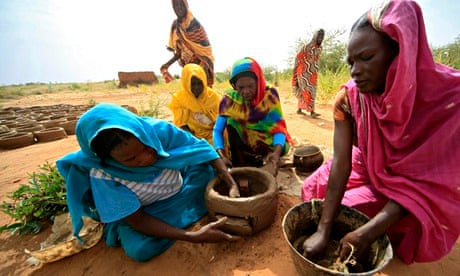The US, Russia and Caribbean states are trying to water down wording that calls for increased funding for women's organisations in the draft document under discussion at the UN Commission on the Status of Women (CSW).
In a paragraph of the document urging governments to "increase significantly resources for grassroots, national, regional and global women's organisations to promote and advance women's rights", the US wants the phrase"women's organisations" replaced with the term "civil society organisations". Together with Russia and the Caribbean states, which are collectively negotiating as the Caricom group, the US also wants to temper the phrase "significantly increase" by writing "provide" or "support" instead.
The amendments may appear small, but women's right campaigners say such details make their work harder. The inclusion in the CSW outcome document of a specific reference to funding women's organisations could improve future funding prospects and could also be included in the sustainable development targets that will replace the millennium development goals (MDGs) when they expire next year. The CSW outcome document will be seen as the policy position for women's rights in high-level debates about post-2015 development.
"I'm not against broad recognition of civil society organisations, but for women's rights organisations it's difficult to access funding at the best of times," said Lee Webster, head of policy at the NGO Womankind, who will be lobbying the UK delegation at the CSW to resist attempts to modify the language.
Zohra Moosa, director of programmes at women's fund Mama Cash, said altering the text "takes away from our agenda for direct finance and resources".
Women's rights organisations are severely underfunded. Their work is often focused on long-term transformative change, such as campaigning for changes in legislation. But that may not attract funders keen on short-term results that can be measured by the number of schools built or education scholarships awarded.
A global survey of 740 women's organisations conducted by the Association for Women's Rights in Development (Awid) in 2010 found these groups had an average annual income of just $20,000 (£12,000). Their total income combined was just a fraction of that of big charities, such as Save the Children or Greenpeace. A fifth of organisations said they feared being shut down due to financial shortfalls.
Awid said the research confirmed that "most women's organisations are significantly under-resourced given the enormous challenges their work aims to address".
However, projects supporting women and girls are increasingly attracting big corporates such as Coca-Cola, Exxon and Intel, as well as philanthropic organisations. A recent examination of 170 corporate initiatives aimed at women and girls, conducted by Awid, Mama Cash and the Dutch foreign ministry, found that $14.6bn was pledged between 2005 and 2020.
About half of these initiatives are based in sub-Saharan Africa. The majority focus on economic empowerment, entrepreneurship, women's health and girls' education. Very little is given to programmes promoting human rights or peace.
Julia Miller, programme co-ordinator at Awid, said the huge sum pledged appeared to contradict the small average incomes mentioned in its earlier analysis, but it was important to understand where and how the money is being spent.
"Often the narrative is simplistic, an emphasis on how providing someone with a resource is going to catalyse change," she said at an event at the CSW exploring funding for the MDGs . "In healthcare, for example, there's a lot of focus on access to prenatal care or building clinics. These are valuable, but if you don't look at the structural issues behind it, such as if legislation on sexual and reproductive health and rights are being rolled back or budgets being cut, these gains will be lost."
According to the research, more than 60% of the private sector partnerships involve NGOs that do not explicitly identify themselves as women's organisations. Only 9% of projects provide direct funding to women's organisations. The report, New Actors, New Money, New Conversations, said that when a company or celebrity was looking for a women's initiative to support, they went to well-known, larger organisations at the expense of smaller women's rights organisations. However, failing to seek expertise from those who have been supporting women, often at the grassroots level, for years "may not only have limited results, but be counter-productive".
The study indicated that the increasing role of the private sector in development, and its growing influence in setting funding agendas and priorities, meant it was important for women's rights organisations to critically engage with corporations.
It added that resources are "urgently needed" to counter the backlash against women's rights in many parts of the world.
One organisation that has engaged with the private sector is Elas, a women's fund in Brazil, which is working on a project with Chevron.
Kelly Kotlinski Verdade, programme manager for Elas, told the CSW that lack of international funding and philanthropic giving in Brazil have forced women's rights organisations to look elsewhere for money.
Yet Elas initially turned a $1m funding offer from Chevron because of the company's environmental record. In 2011, however, Chevron and Elas launched the Women in Motion programme, helping women in the favelas of Rio de Janeiro and elsewhere to develop their businesses.
Elas emphasised to Chevron that results should be evaluated on a social as well as economic basis, insisting on a collaborative approach. "You have to be clear from the beginning otherwise they will overcome you, as they are bigger," said Verdade.

Comments (…)
Sign in or create your Guardian account to join the discussion